The One Thing(s)

You can title a business book with 1001, 13, seven, or just five “most important” rules, skills, habits or bits of advice, but the supreme discipline is to boil it all down to exactly one thing. The one thing. There are some wonderful examples of this in getAbstract’s library – some you may never have heard of, and others among the most widely read. We have grouped them thematically for you.
Focus
At the beginning of every task (and every Journal article) you need the right focus: your well-proportioned attention to exactly one thing. And, of course, there’s a book to go with it that tells you how to get that focus right. It comes from someone who initially didn’t think much of the idea: Gary Keller, co-founder of Keller Williams Realty and a best-selling author, overcame his own issues about focus, which makes his claims about cultivating better habits even more compelling. Multitasking isn’t fruitful, he says, since success requires long periods of laser-like concentration, not scattershot swats. If you find your “ONE Thing,” Keller says, everything else will fall into place.
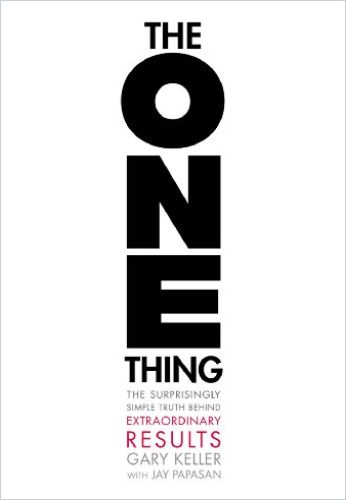
Take-Aways:
- Multitasking and following long to-do lists might pose the biggest obstacles to achieving your goals.
- Superior success comes from extraordinary focus on your “ONE Thing.”
- Learn more…
Purpose
OK, so now you know how to concentrate properly. But you may not yet know on what? You’re not alone: Many people wander through life with no direction or personal goals, even successful individuals with good jobs and hefty salaries. Modern-day Renaissance man Phil Cooke, a media consultant, offers some great ideas about how to discover your true purpose in life and work toward it (without going mad). Practical and inspirational, Cooke explains how to live a meaningful life and offers plenty of warmth and encouragement. And to make sure “his” One Big Thing sticks, he even invented the abbreviation OBT for it.
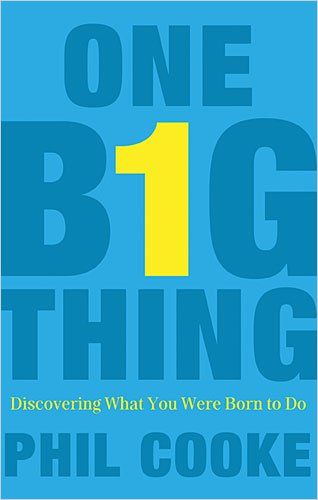
Take-Aways:
- Ask yourself what you can do better than anyone else in the world.
- You cannot discover your OBT until you know who you are.
- Read more…
Managing
Who needs seven habits when one will do? That’s what Marcus Buckingham must have thought when he pitched to the world in 2005 that all you need is the one proper worldview to make all management operations perfect. A lot has happened since 2005, yes, but quite fundamentally, optimism is still a good thing, and all the talk of the right “mind-set” that is currently so popular is actually already in his book. Buckingham, on top of that, is an original thinker who lets his intellect roam, and he offers sharp insights into the evergreen topic of leadership by masterfully navigating a perilous balance between clarity and oversimplification.
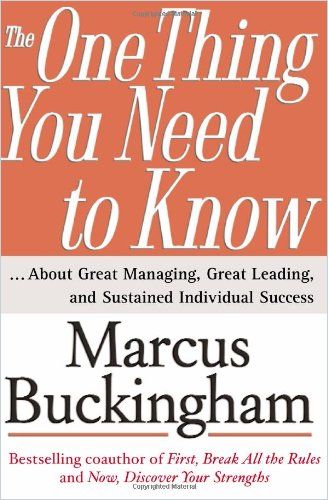
Take-Aways:
- The one thing great leaders do is to motivate people to believe in a better tomorrow and pursue it.
- Leadership is often mistaken for heroism or success. It is neither.
- Great leaders not only have a vision for change, they feel an urgency to achieve it.
- Learn more…
Entrepreneurship
The quintessential stereotype of an entrepreneur is a person who takes big risks with big money. But what really distinguishes a good entrepreneur from a bad one? It is, you will have guessed, one thing above all – and it’s The Sure Thing. Here, best-selling author Malcolm Gladwell provides evidence to dispel the popular myth that all successful entrepreneurs are gamblers. He presents numerous case studies of business people who carefully analyzed all the available data before seizing an opportunity others had overlooked. Surprisingly, many great entrepreneurs rely on their strong self-confidence which allows them to ignore naysayers.
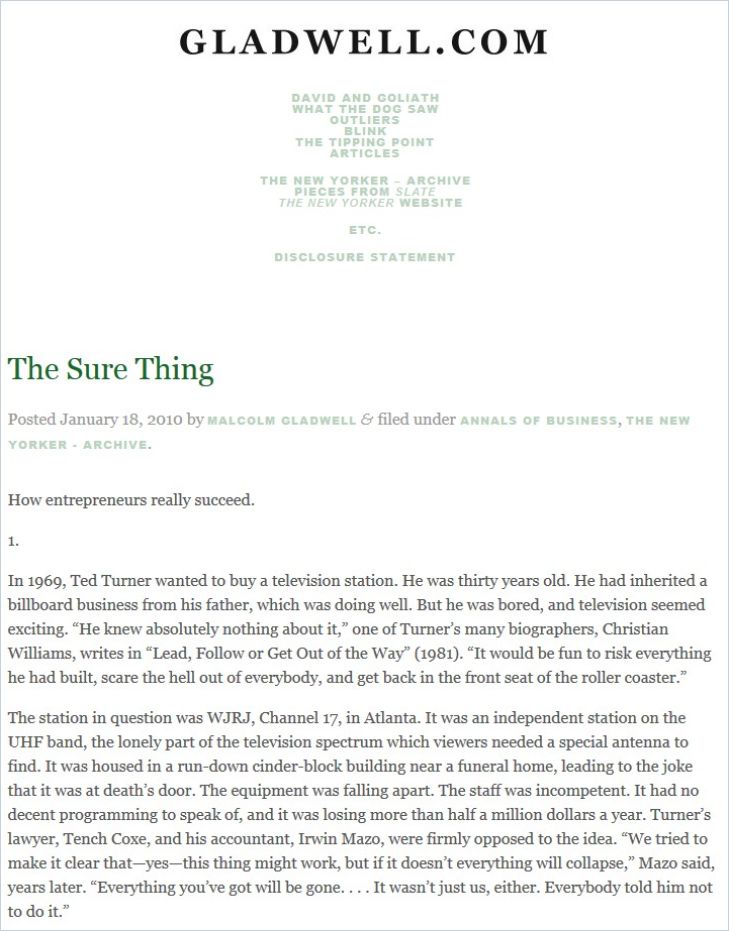
Take-Aways:
- Most entrepreneurs who take risks fail at business.
- Successful entrepreneurs are temperamentally unsuited to living with risky decisions.
- Self-employed people enjoy their work and don’t want to risk their happiness for the chance of more money.
- Read more…
Funding
If there’s one thing entrepreneurs – good or bad – need when starting out, it’s funding. And wouldn’t it be nice to be able to forget all the funding advice from the relevant literature because there is one perfect pitch for it? There is of course, at least according to the book title: Communication and media expert Marie Perruchet explains in One Perfect Pitch how to resonate strongly with high-tech venture capitalists (VCs). She used to cover VCs as a journalist reporting on Silicon Valley entrepreneurs, so she understands what makes Silicon Valley VCs tick, what they want to hear, and what will motivate them to invest. Her manual includes a comprehensive set of rules for entrepreneurs.
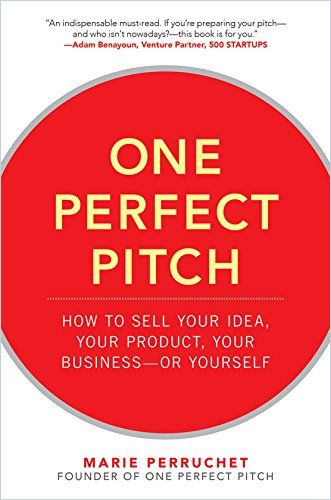
Take-Aways:
- Most technology entrepreneurs can’t communicate their business ideas or hi-tech development plans to investors. They need a “perfect pitch.”
- Entrepreneurs should create and hone a story that resonates with investors.
- The emotional connection your stories make matters more than the wording you use.
- Read more…
Investing
“When I see memos from Howard Marks in my mail, they’re the first thing I open and read. I always learn something, and that goes double for his book,” writes investing legend Warren Buffet. So there must be something to lifetime value investor Howard Marks’s insights – and luckily, he has distilled his approach and experience into a concise, focused text that offers seasoned investment wisdom to those looking for a way forward in today’s financial markets. The Most Important Thing, a compilation of Marks’s investor newsletters (“memos”), contains exceptional chapters on risk management, contrarian thinking and market psychology, as well as a cogent analysis of value investing. Fortunately, he refrained from abbreviating the matter with “TMIT.”
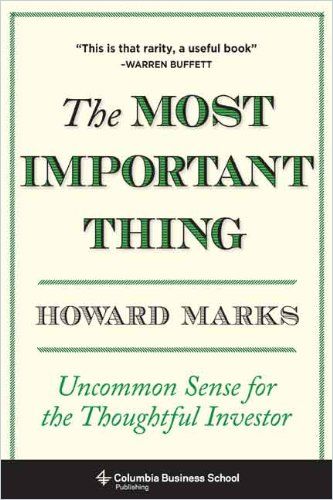
Take-Aways:
- If you want your investments to beat the market, develop “second-level thinking.”
- Second-level thinkers don’t follow the crowd; they use insight and intuition to go beyond the obvious in assessing an investment.
- Good investors analyze a firm’s “fundamentals” to get a stock’s “intrinsic value.”
- Learn more…
Financial Collapse Prevention
Listening to Howard Marks when it comes to investments is good. But listening to Adam Tooze when it comes to limiting wildfires in finance (and the world economy) is no less smart. For him, the COVID-19 crisis – and its aftermath – poses the question: “How does America’s central bank supply dollar liquidity to a polycentric world economy?” In response to the 2008 crisis, the Federal Reserve injected huge amounts of money into the financial system. But unlike then, when banks in the United States and Europe were at the center of the crisis, the financial effects of the COVID-19 pandemic are widespread, and it’s unclear whether the methods of the Fed and other major central banks will work. His idea: So-called liquidity swap lines should move US dollars among central banks all over the world.
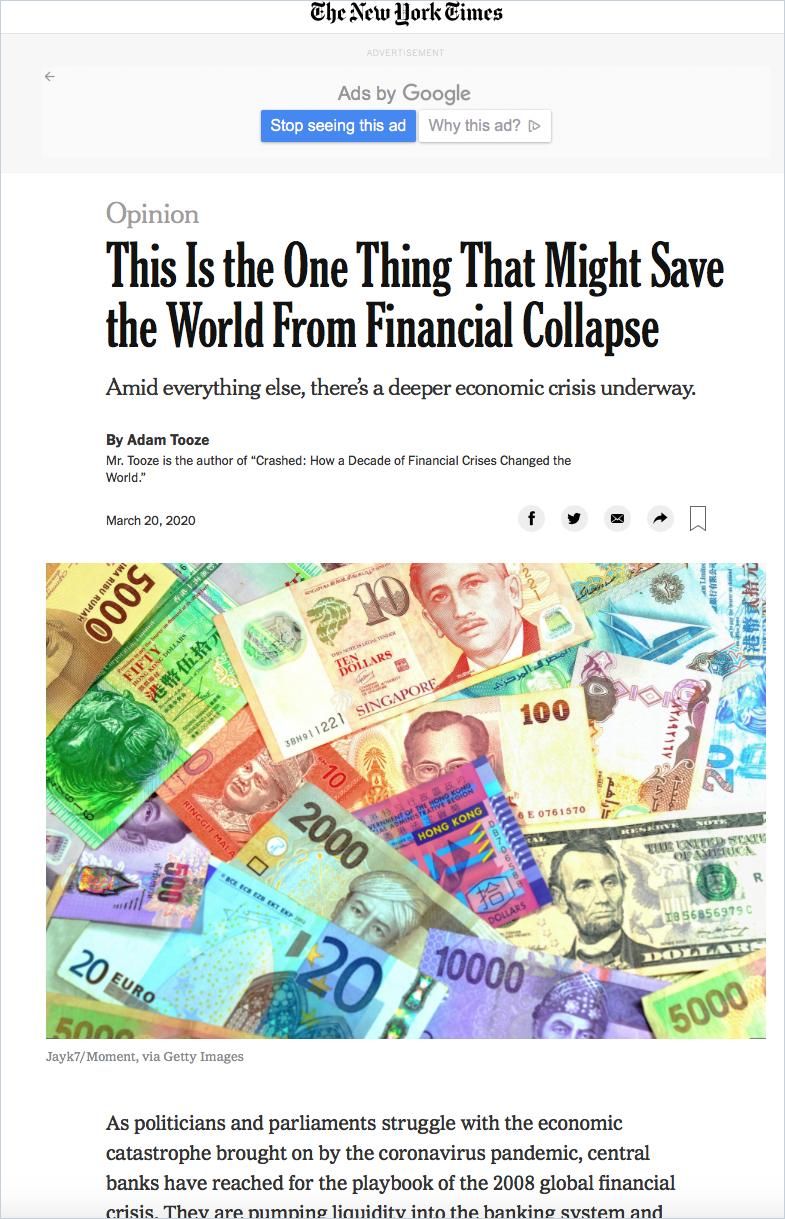
This Is the One Thing That Might Save the World From Financial Collapse
The New York TimesTake-Aways:
- “Liquidity swap lines” inject US dollars into the world financial system, but they’re limited.
- The fulcrum of the global economy has moved toward emerging markets, which demands changes in how monetary authorities act.
- Learn more…















